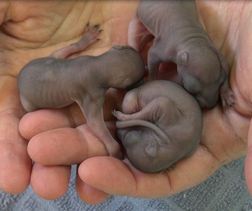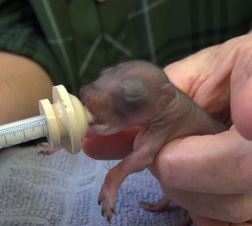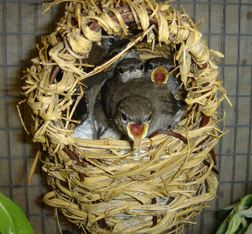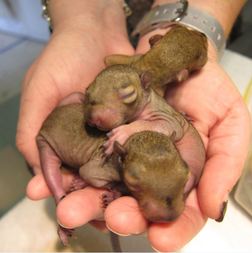WildCare's Wildlife Hospital treats nearly 4,000 ill, injured and orphaned wild animal patients from over 200 species every year. This is the story of one group of orphaned babies.

The nest these newborn squirrels called home fell from its tree in heavy winds -- spring storms often mean danger for tiny babies like these, as does spring-season tree trimming and gardening work.
WildCare recommends you regularly check your yard and neighborhood for fallen babies and call your local wildlife rescue center if you find one.
Babies this young lack fur and the ability to maintain their body temperature, so rapid response can literally save their lives. These youngsters were lucky -- their rescuer saw them soon after their nest hit the ground. He called WildCare and got the babies to the Wildlife Hospital in good time.
Medical Staff immediately warmed the tiny squirrels by heating dry hand towels in the microwave and wrapping them around the furless babies. This soothing, dry heat raises the little ones' body temperature and makes them comfortable quickly. These babies were perfectly healthy, so, once warm, they were given subcutaneous fluids and oral electrolyte solution to keep them hydrated, while plans were made to attempt to reunite them with their mother.
Although WildCare does a fantastic job raising orphaned wild babies, we know wild baby animals are always better off if they can be returned to their mothers' care.
Unfortunately, despite our best efforts, reunite attempts on two different mornings were not successful, so these three squirrels became the first Foster Care orphans of 2016. We anticipate 150-200 more baby squirrels will come through our doors in the next weeks and months... It looks like 2016 will be a big year for orphaned squirrels, especially with Baby Season's early start!
Rescuing fallen babies like these is one way you can help wildlife this spring, but you can keep even more babies safe by delaying non-emergency tree and gardening work!
Spring may feel like the proper time to neaten up your garden and prune your trees, but be careful -- wild animals are probably already using those branches as a nursery... even as you read this!
Every spring, baby animals arrive at WildCare that have been orphaned or injured because their nests were damaged or removed. Most people are appalled to find they have caused these accidents, especially when the injury to wildlife is so easy to prevent: just procrastinate!
Wait until resident wildlife have raised their broods, or even better, until nesting season is over. If you're facing an active nest, it really won't be long -- usually just a matter of weeks. Before you cut that tree, take a look to see if there are wild families already living there. If so, give them a chance to grow up and move out. Some species of birds (especially raptors -- birds of prey) nest in hidden tree cavities, so don't forget to check both limbs and trunks thoroughly before trimming or removing.
When is wildlife nesting?
There is some variation, but most wild animals have their babies in March through August.
If you can plan to trim your trees in the autumn months instead of during the spring and summer, you can completely avoid the possibility of damaging a nest. Autumn pruning is also healthier for the trees, as autumn and winter are when the sap has gone down and trees will be in their dormant phase.
If a wild baby has fallen from a tree, first, be sure he is warm and protected, then call your local wildlife center (click here for a state-by-state directory). Staff there can help you figure out how to do the right thing to help the little one and maybe even reunite the wild family.
Baby birds and mammals knocked from nests that remain intact MAY be returned to their nests! A mother bird or squirrel will continue to feed her babies after they have been handled by a person (although a mother may smell your scent on her baby, she will not be deterred from caring for him). However, if a baby is obviously injured or if he is cold, please contact your local wildlife center immediately.
WildCare is a 501(c)3 nonprofit organization supported almost entirely by private donations and individual memberships. Visit us online at wildcarebayarea.org.



